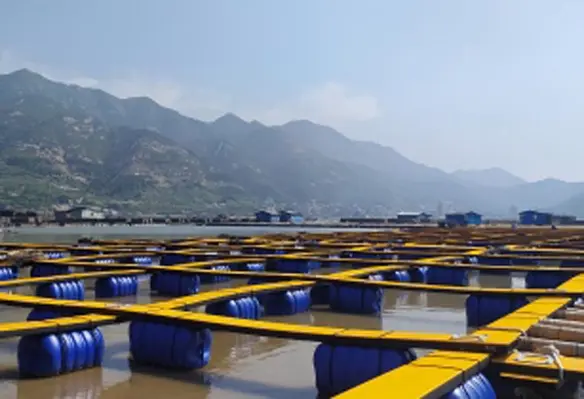BASF, a German multinational chemical company has supplied the light stabiliser Tinuvin to Fujian Atlantis Plastic Products Co. Ltd., a company specialising in the production and processing of plastic products for marine floats, to protect polypropylene (PP) pontoons used by fish farmers in Ningde, Fujian Province of China
According to BASF, like all plastics, PP is susceptible to UV light and heat, which can result in colour change, surface cracking, and ultimately, product failure. To make the pontoons resistant to intense sunlight, a light stabiliser such as Tinuvin is added to the polymer during manufacturing. Tinuvin protects the PP pontoons from the negative effects of prolonged exposure to UV light thereby improving its weatherability and extending its lifetime from three years to more than five years.
“Strong, durable, and safe – these are qualities that should always come to mind when employing a plastic floatation system,” said Hermann Althoff, senior vice-president, Performance Chemicals Asia Pacific, BASF. “Our UV stabilisation products create a stress-crack-resistant platform that maintains the structural integrity of the plastic article for many years.”
Ningde in southeast China’s Fujian Province produces most of the country’s cultured seafood. Thousands of fish farmers, who have resided along this coastal area for decades have transformed this little fishing village into the epicentre of the yellow croaker industry – producing 75% of the nation’s total output in 2019.
In aquaculture, floating pontoons interconnected by plastic walkways act as enclosures to raise seafood like shrimp, oysters, and fish. While raising fish, crustaceans, and molluscs in landlocked ponds and fenced-in ocean pens have gone on for decades, what has changed is the traditional solution of low-end, low-cost applications for fish farmers.
“Fish farmers are sensitive to cost, and previously used pontoons made of foamed plastics. These become brittle and prematurely break,” said Min Lin, general manager of Fujian Atlantis. “By using Tinuvin, we could achieve a high-quality, more durable pontoon that is not susceptible to breakage, chalking and fading even under extreme sunlight. This reduces costs for the fish farmer and enhances our reputation in the market. Furthermore, the pontoons can be recycled at the end of their service life which will reduce the volume of waste headed for landfills.”




